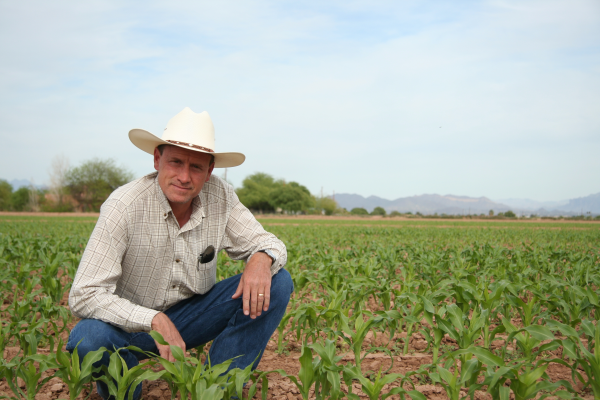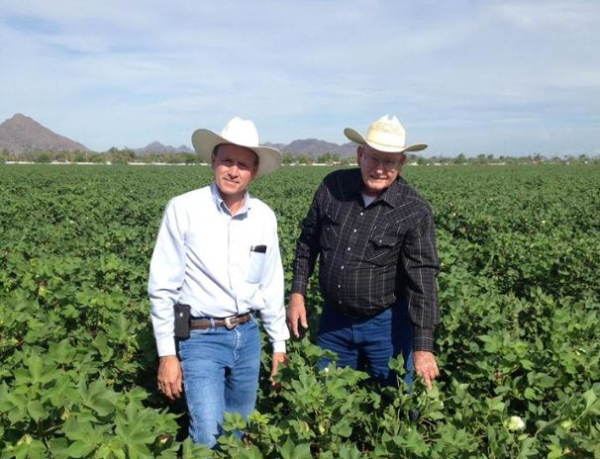Meet Arizona Agriculture's Hatley Family!
Published
9/22/2014
Justen Ollendick, Arizona Farm Bureau Intern: Meet father and son farming duo, Sonny and Adam Hatley. The Hatley family is just one of thousands of family owned/operating farming operations in Arizona. In fact, more than 96% of Arizona’s farms and ranches are family owned and operated, nationally it’s just one percentage point more. A supporter of the community, the industry, and everything in-between, just goes to show how much this Arizona farming family cares for the agricultural industry and community as a whole.
An interview with Adam Hatley of Associated Farming Company.
Part of an ongoing series about Arizona Farming and Ranching Families.
Talk about your farm: The partners of Associated Farming Company include, Adam’s parents, Aubrey (Sonny) and Diane Hatley, his sister Stephanie Hatley, Michelle Hatley and myself, Adam. Our farm consists of 3,600 leased acres on the Salt River Pima Maricopa Indian Community. Our crop acres include: 1,800 acres of cotton, 750 acres of alfalfa, 300 acres of corn, 200 acres of barley, and 30 acres of sweet corn.
What changes have you seen in your lifetime as it relates to farming and/or ranching? The most significant change is the introduction of biotechnology in agriculture. Prior to the introduction of biotech we had large crews in the fields in the heat of summer hoeing weeds, and spraying for pink boll worm every 14 days. With the new technology, we can control the weeds with herbicides and the crops are resistant to pink bollworm. Biotechnology has made a positive impact in our industry and in our environment.
As science, the research and studies continue to reveal, biotech crops are continuing to improve our environment, allow us to grow more on less land and improve in areas we never imagined before. As a cotton and corn producer, to me the biggest benefit has been our drastic reduction in pesticide applications.
What changes have you seen in your lifetime as it relates to farming and/or ranching? The most significant change is the introduction of biotechnology in agriculture. Prior to the introduction of biotech we had large crews in the fields in the heat of summer hoeing weeds, and spraying for pink boll worm every 14 days. With the new technology, we can control the weeds with herbicides and the crops are resistant to pink bollworm. Biotechnology has made a positive impact in our industry and in our environment.
As science, the research and studies continue to reveal, biotech crops are continuing to improve our environment, allow us to grow more on less land and improve in areas we never imagined before. As a cotton and corn producer, to me the biggest benefit has been our drastic reduction in pesticide applications.

Adam Hatley, seen here in the 30-acres of sweet corn he planted this last spring, along with most farmers is always looking for opportunity in agriculture to diversity the crops and/or business model where it makes sense.
Why did you choose to go into agriculture? It was a family business.
What generation of farming are you? I am a third-generation farmer. My grandfather farmed in Arizona and Texas; my dad operated a farm/ranch in West Texas before coming to Arizona.

Adam and his dad, Sonny, in one of their cotton fields.
Will anyone in your family...younger generation...pursue farming? As of right now, that is undetermined.
Would you ever consider growing an emerging crop or changing your farm model? For agriculture to be sustainable and profitable we have to progress with the changing times. Even though cotton has been our mainstay since the beginning, we are diverse enough to grow the commodities that give us the best opportunity for profit.
What are your community activities? Why are you involved? I served on the Natural Resource Conservation District Board, County and State Farm Bureau, Arizona Cotton Growers, Cotton Research and Protection Counsel, and the Cotton Board. I’m also involved in my church. I think it’s important to give back to our industry and the community and in doing so I’ve been able to meet great people.
What is one fact/experience/achievement no one knows about you? I’m a graduate of Texas A & M Executive program TEPAP (The Executive Program for Ag Producers). Sonny received the High Cotton award for the southwest region in 2008.
What do you think you do really well? Explain. As it relates to our operation, my dad and I focus on taking advantage of new technology and being as efficient as possible without compromising productivity.
Why are you a farm bureau member? I’m active in Farm Bureau because they’re great advocates for farmers and ranchers.
How do you participate with your county Farm Bureau? I served on the county board, and past president.